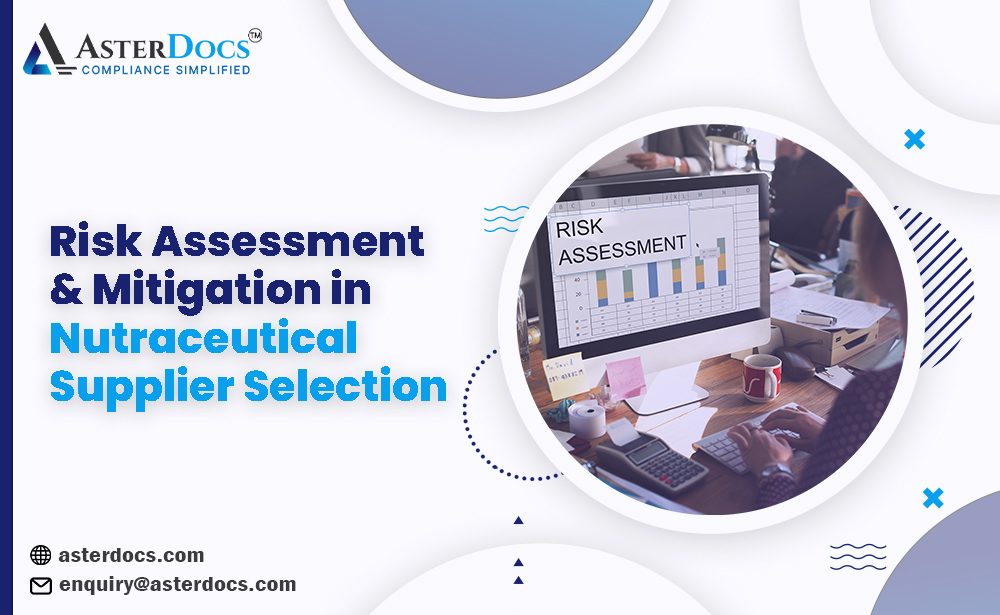The nutraceutical industry is growing rapidly. The increasing consumer demand for natural health and wellness products is driving the growth. As companies seek to deliver high-quality nutraceuticals to the market, one critical aspect is the selection of reliable and trustworthy suppliers.
The evolving regulatory landscape, product quality concerns, and supply chain complexities is also increasing. Hence, it is essential for nutraceutical companies to conduct thorough risk assessments. Companies must also implement effective mitigation strategies during supplier selection. In this blog, we will explore the importance of risk assessment and mitigation in nutraceutical supplier selection. We will also discuss discuss key considerations for a robust selection process.
Understanding the Risks in Nutraceutical Supplier Selection
Selecting the right suppliers is crucial for nutraceutical companies. It helps to ensure product quality, compliance with regulations, and customer satisfaction. Failing to conduct proper risk assessments can lead to a range of potential risks, including:
- Quality and safety concerns: Poor-quality ingredients or contaminated products can pose health risks to consumers. It can also damage brand reputation, and result in costly recalls.
- Regulatory non-compliance: Suppliers who do not meet regulatory standards may expose companies to legal and compliance issues. It might lead to penalties and market restrictions.
- Supply chain disruptions: Unreliable suppliers can cause delays, shortages, or inconsistencies in the supply chain. Thereby, impacting production schedules and customer satisfaction.
- Ethical and sustainability concerns: Suppliers with unethical or unsustainable practices can damage a company’s reputation and brand image. Especially consumers prioritize social and environmental responsibility.
Mitigating Risks in Nutraceutical Supplier Selection
To mitigate risks in nutraceutical supplier selection, companies should consider the following strategies:
- Thorough due diligence: Conduct comprehensive background checks on potential suppliers. Thereby evaluating their track record, reputation, and compliance history. Verify certifications, licenses, and adherence to industry standards.
- Quality assurance and testing: Implement stringent quality assurance protocols, including product testing. Hence, you can ensure suppliers meet quality and safety requirements. Evaluate suppliers’ manufacturing processes, quality control procedures, and adherence to Good Manufacturing Practices (GMP).
- Supply chain transparency: Seek suppliers who demonstrate transparency in their supply chains, providing visibility into sourcing, traceability, and sustainability practices. Consider suppliers who source ethically and have robust traceability systems in place.
- Risk management systems: Assess suppliers’ risk management systems and procedures, including their ability to identify, assess, and mitigate risks. Evaluate their approach to risk prevention, contingency planning, and crisis management.
- Supplier performance monitoring: Implement ongoing monitoring and evaluation of supplier performance, including key performance indicators (KPIs), quality metrics, and customer feedback. Regularly review and assess suppliers’ performance to ensure consistent adherence to standards.
- Contractual agreements: Establish clear contractual agreements that outline expectations, responsibilities, and quality specifications. Include provisions for product quality control, compliance, dispute resolution, and termination clauses.
The Bottom Line
Selecting the right suppliers is a critical aspect of ensuring product quality, compliance, and customer satisfaction in the nutraceutical industry. By conducting comprehensive risk assessments, implementing effective risk mitigation strategies, and prioritizing transparency and quality, nutraceutical companies can minimize potential risks associated with supplier selection.
Through diligent due diligence, ongoing monitoring, and robust contractual agreements, companies can establish a reliable and sustainable supply chain that supports their commitment to delivering safe, high-quality nutraceutical products to consumers.













